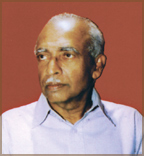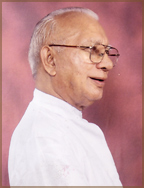|
dailynews |
|
|
|
|
|
OTHER LINKS |

|

|

|
|
|
|
|
He says that this book is written for the young readers. We do not have a rich juvenile literature and a novel of this type catering particularly to the young is indeed a felt need of the time.
As a novel for the young, 'Loku Putha' has all the ingredients to call it such a novel. There is the spirit of adventure.
How a young man looks at life away from the traditional view of his father is carefully portrayed.
importance
The love for the family centered on the adoring mother carries the story with a rear pace. The incidents are related in quick succession, but with a rippling effect as that of verdant stream flowing down.The institution of the family is portrayed in a way that shows its importance especially to the rural young in the family we have in Sri Lanka.
The mother is the central figure. Every action in the family emanates from the mother, centered round her.
In this story, when the mother is suffering from an illness, the entire family feels it. The elder son, Bandu who is the central figure in this novel feels it most.
young animal
The elder son's character (Loku Putha) is carefully constructed. We see how much he loves his mother and sister and brothers. His love for the animals is another trait that most young people do possess.
It is this love which make him risk himself in freeing the young animal. The way he frees the animal from the man (a butcher) who bought the animal from his father, is full of adventure.
His pursuit of the man on a bicycle and eventual cutting of the rope which bound the animal and rescuing it, is full of adventurers. The young people would relish it.
Two other aspects of his young adventurous life are seen when he ran away from home and when he rescues his sister. He ran away from home because his father caned him and twisted his ear round.
Bandu went away from home and found a job in a rattan shop. His genius was observed by the rattan shop owner who exploited him to the full. Bandu had the flair to turn out different items such as tables and chairs.
slavery
This shows the young, about their own talents and the striving that one needs to engage into reap the best out of life with such talents.
Bandu rescues his sister from a rich house to which she was given as a servant charted by a close relative.
This normally happens in the village where children are often given to slavery with the help of middleman who are sometimes one's own kith and kin.
Bandu goes to the house, conceives of a plan and with the connivance of the sister rescues her. She climbs the wall round the house.
She is able to undertake this daring adventure because of Bandu's planning, guidance and spirit of adventure.
He helps her to buy a sewing machine and also finds her a place in the town with the help of the father where she could carry on her business.
emotions
Although the love of the mother is explicit in the village, a father rarely shows his emotions. Austin, the father is a strict man. But as his character is portrayed we see the affection for his children hidden in the strict facade he puts forth. According to him, Bandu need not have taken the bold step to flee from the house when he was punished by him.
Having learned about son's whereabouts, Austin immediately goes in search of him without delay. This shows his love for the son.
lively style
Jayakody Seneviratne's 'Loku Putha' is a novel I cannot forget. It is woven in simple fabric with a lively style carved out from colloquial and classical Sinhala.
This style I believe cannot be easily imitated. I am reminded of the great sociologist C. Wright who states that from the decades he strived to perfect his style.
I think Seneviratne would have devoted his lifetime to develop this singular style. My thanks to Dayawansa Jayakody for publishing this novel and his other books. It is a singular contribution to Sinhala literature.
Teacher thinks aloud
The confessions of a conscripted teacher
Author: Thilaka Vivekanandhan Wijeyaratnam
55/1, Vivekananda Road, Colombo 6
124 PP Price not mentioned
Review: Shyamala Devi Karunakharan
TEACHING: The Confession of a Conscripted Teacher is the latest release of Mrs. Thilaka Vivekanandhan Wijeyaratnam depicting precisely how she embarked as a teacher and its subsequent influence on her life.
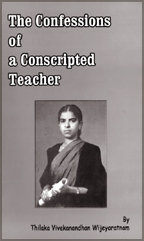
She has very efficiently presented her professional life giving a full account of a life-long teacher, using an absolute sense of humour with a lot of amusing events.
She starts off with her father's wish to see her become a teacher, who according to her has threatened and forced her to accept the teaching profession which she had acknowledged much against her will. Then comes her first appointment at Kegalle Balika Vidyalaya and her unforgettable hostel life with her fellow teachers.
Thilaka has been an appealing teacher and has enjoyed every bit of time spent with her colleagues. She very confidently remembers their names and some interesting incidents.
She had been very attached to her colleagues at Balika and she decided to resign the post here and join Badulla Vishakha Vidyalaya along with a few others to support her colleague who got a Principal's post there.
Treat
It is indeed a treat to read how she had enjoyed her youthful days - dismissive of the future, free from all responsibilities savouring the authentic pleasure of that belated age which any person would love to recollect quite often in their lives.
Spending her Sundays at Dunhinda Falls with her friends joyfully with the caretaker and some incidents she has mentioned are very interesting.
In three months she moved to Nuwara Eliya to take up the post at Good Shepherd Convent. Here too she became popular among students for initiating the junior and senior interact clubs.
In three and a half years she was transferred to Matale Pakia Vidyalaya over a dispute with the then government's take over of the school. Here she served for eight months.
After her marriage from there she managed to get a transfer to Mulliawalai Maha Vidyalayam, Mullaitivu in order to join her husband who worked in Mullaitivu. In a year she moved to Mullaitivu Maha Vidyalayam where according to her she lived with an extinct tribe, so serious minded people.
She managed there for five years and moved to Vavuniya Tamil Maha Vidyalayam. This was the longest period she had served in a school. Here she had to face a lot of problems and challenges which she successfully withstood with her husband being the biggest solace for her.
He had been a pillar of strength to her right throughout.
In addition to teaching science subjects and English she has been the disciplined teacher and teacher in-charge of prefects.
She retired in 1983.
Criteria
After a short interval in 1985 when she was 50 years she tried and got a job at Aminiya School, Maldives, although her age did not fit their criteria. Here she mentions about different types of students with different problems and attitudes and how tactfully she tackled them. These explanations deserve to go on record for others to follow.
After her husband's demise and the subsequent difficulty in her life she returned to Colombo and joined Hindu Ladies College in 1993. After a walkout from the school over a dispute with the principal over salary issue she spent two years working in a computer firm and then in a law firm which did not please her as teaching did. However she continued giving tuition classes at home.
In 2004 she rejoined Hindu Ladies after a short stint. Before winding up the book she gives a full account of all the principals she has worked under and acknowledges that her first principal Mrs. Udalagama at Kegalle Balika Vidyalaya remains the best.
Behaviour
There are some worthy tips on students' behaviour and hints on reacting to them politely, which I think are highly comprehensive and refined. She released the book on July 30, along with the Tamil version.
Thilaka completed her B.Sc at Madras Christian College, and obtained her Diploma in Education from the Open University of Sri Lanka.
Apart from teaching Science and English, being equally fluent in Tamil she has composed over 25 Tamil ballet dance dramas which were staged in Colombo. She is a playwright too.
Proudly concluding her fifty years of teaching life she defines her profession as a "Learning Process" which has no end and admits that she highly enjoyed the time spent with the teenagers. The books are available at 55/1 Vivekananda Road, Colombo 6.
Pleasure through adventure
Hunnasgirikande Raja Maligawa
Author: Gunaratne Ekanayake
Review: Somapala Arandara
FICTION: Armed with a copy of Gunaratne Ekanayake's latest novel, or rather a novelette, "Hunnasgirikande Raja Maligawa" (The Royal Palace on Mount Hunnasgiri), I was going through his Foreword when my attention was drawn to a naive remark he had made. He reiterates the need to get children into the habit of reading books.
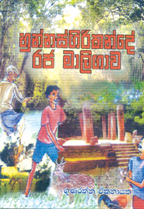
Thereby they can be saved from the perils of their various worlds of illusion and their scant affection to their elders. This remark reminded me of Sir Francis Bacon's immortal words: "Studies serve for delight, for ornament, and for ability. Their chief use for delight is in privateness and retiring, for ornament, is in discourse, and for ability, is in the judgement and disposition of business."
Gunaratne Ekanayake questions why most of the present-day parents do not encourage their children to read books whilst spending lavishly on artificial food items, toys and posh clothing. Providing children with a small library will bring them peace of mind who are otherwise lost in destructive pursuits.
Magic spell
When one comes under the magic spell of an interesting and adventurous story in one's childhood, there emerges supreme happiness. To recapture those precious moments of indulgence is sufficient justification for the renewal of the acquaintance.
Where children's stories are concerned there comes a long line of authors like, only to name a few, R. L. Stevenson (Treasure Island), Daniel Defoe (Robinson Crusoe), Enid Blyton (Famous Five), Montgomery (Anne of the Green Gable), J. K. Rowling (Harry Potter), W. A. de Silva (Lakshmi Hewat Nonasena Rajiniya), Martin Wickremasinghe (Madol Doova), Munidasa Cumaratunga (Kiyawana Nuwana) and Sybil Wettasinghe who links the recent past and the present with her creations.
After writing romantic stories for youngsters like "Yapanaya Tawamat Atayi" and "Usawiya Nihandayi". Gunaratne Ekanayake enters the world of children, the early teenagers, with his latest work of adventure, "Hunnasgirikande Raja Maligawa."
The critical eye of middle age is apt to discover that the idols of youth have feet of common clay. The plot of Ekanayake's book, if there is a plot, is very simple. But behind this simplicity lies the subtle craft of the story - teller. Ekanayake's merit lies in the fact that he has a knack of merging his own individuality reflected in a fictitious creative work.
adventure
Children's stories must necessarily contain adventure and pleasure. And Ekanayake's novel amply does justice to that aspect. Kiriella and the party depart on a top from Colombo to Kandy. From there, they travel to the foot of Hunnasgiri hill. 'After that, they start walking up the hill clearing their path infested with bushes. To their support, a guide is hired.
Close to the top of the hill, on a landing which seems to be the ruined site of an old royal house, the children get lost inside a network of underground tunnels which seemed to have been occupied by a former king. The whole of the night is full of search operations. And there's high tension, fear, curiosity and hopefulness among the parties concerned.
The writer's choice of the setting for action is commendable. Whoever has climbed that hill knows how fitting an environment it is for a set of inquisitive minds. Moreover, Hunnasgirikanda possesses a mystic and awe-inspiring haughtiness which Nature has bestowed on it. Ekanayake's novel is good for light reading for adolescents, too.
Guidelines for development
Rata Sanwardanayata Liyu Lipi
Letters written for the development of the country
Author: S.H. Perera
pp. 272, Price - Rs. 375
Review:Sarathchandra Jayakody
Former Senior Editor, Sinhala Encyclopaedia
ECONOMY: Development has been defined at present according to the criteria of each different country. However, for a Third World country like Sri Lanka where there are gene differences, ancient living cultures etc., there should be new means of application for the development. On such a criteria the so-called developed nation will come second to most of the Third World countries.
If we could discard most of the examples given by the West and take those that are useful for our country as a single unit, then we should be able to direct our country towards development. The development of a country is not merely to work on a target, but to administer that country for the sole benefit of all the living creatures.
The book by S. H. Perera written with his experience gathered for more than 15 years on environment, administration health etc., is a compendium that would be useful for those administrators who find it difficult to know what should be done, and for the general public who too are baffled by such difficulties.
However, the collection of letters by the author will awaken both the public and the administrators from their deep slumber to learn how a country has been put into such a situation of chaos in the past as well as in the present.
It is useless to utter the same old record of "We have no funds, no technological know-how." We should get examples of such developed peaceful states like Switzerland and Singapore which are smaller than Sri Lanka and listen to what is stated by scholars through their writings as in the case of the present book.
The brief style followed by S. H. Perera in his writings should be an example to those pundits who write at length.
The introduction to this book by Prof. J. B. Disanayaka also mentions that fact. He emphasizes that his book will provide lessons to both the administrators and the ordinary people.
Furthermore, the professor says that the efforts of the author to improve the status of the Sri Lankan people will bear fruits.
The book is printed in a good finish and is price marked moderately.
Book launch to mark felicitation ceremony
COLOMBO: Four new books will be launched at the Rev. Fr. Ernest Poruthota felicitation ceremony to be held at the BMICH Committee Room B on August 31.
The four books are Susantha Tissera's Cinemave Saha Madhayaye Apekama, Vijith Rohan's Sevayata, Fr. Ernest Poruthota's Gihiya and Maximus Roy's Poru Piya Upahara.
|
|
Fr. Poruthota who celebrates his 75th birthday is well known for his immence contribution to Catholic literature, Catholic liturgy. Young Christian Student Movement, Young Christian Workers' Movement and the Media.
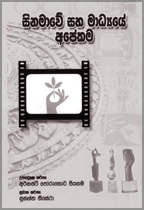
The salutation song has been written by Prof. Sunil Ariyaratne with music composed by Rohana Weerasinghe. This will be sung by Ivor Dennis and Lata Walpola at the ceremony. Rev. Fr. Jayalath Balagalla, Director of the Christian Studies at the National Education Institute, Maharagama and Superior Dominican Fathers, Sri Lanka, will deliver the introductory speech.
The Keynote address will be delivered by Tissa Abeysekara on "The Christian Contribution to National Culture and the Role of Rev. Fr. Ernest Poruthota". A short video documentary directed by Sudath Mahadivulweva will be screened.
The Bank of Ceylon is the main sponsor for the felicitation programme.
Christian belief made simple to Sri Lankans
Rediscovering Christ in Asia
Author: Bishop Kenneth Fernando, ISPCK, Delhi 2005
Review: Rev. Dalston Forbes OMI.
RELIGION:Bishop Kenneth Fernando, retired Bishop of the Anglican Church, Colombo, has written a book he always dreamed of writing in the evening of his life. It is entitled "Rediscovering Christ in Asia", and is published by the ISPCK, India in Delhi, 2005.
The Foreword is written by Lord George Carey, former Archbishop of Canterbury.
The purpose of the book as the author says in the Preface is to make understandable Christian belief to Sri Lankans, especially those of other faiths like Buddhism and Hinduism.
To cite his words: "How can I present what I have studied and know about the Christian faith to friends of other faiths in ways that will be intelligible and non-threatening to them, in categories that are familiar to them". (p.X1.) Bishop Kenneth has gone through the major doctrines of Christian belief, God the Creator, Sacred History, who is Jesus, His Doctrine, Death and Resurrection of Christ and the Eucharist.
The language is clear and lucid and not technical. The type is large and easily readable. The footnotes could have been more plentiful; sometimes references to published books are not full and complete.
The author asks himself why Christianity has failed to spread in Asia and comes to the conclusion that this is a problem of communication.
European thought forms and language were imported into Asia and not adapted to the local cultural mind-sets and context. As he writes: "I believe that if we learn to communicate more effectively and more ironically we will be heard better and be treated with less suspicion". (p.24).
A good example is found in the study of the idea of Sacrifice. The author cites a dialogue between Kutadhantha and Buddha on what is the best sacrifice in the Digha Nikaya. Sacrifice is not the offering of thousands of animals, nor of one's ancestral wealth. It's to take the Buddha and the Truth as one's guide with a trusting heart.
It is to take upon oneself the Five Precepts and to live according to the Four Noble Tuths (p.88) The ethical aspect is what gives value to sacrifice and here we join the love and self-oblation of Jesus upon the Cross. This is a fine work, the result of 40 years ministry of discovering Christ in Asia.
Those of us who know Bishop Kenneth, will discover his familiar accents in this book. We thank him and his wife, Chitra, for this testament that he leaves to his Anglican flock and his friends in the Churches and even outside.
Bookshelf
COLOMBO: Kalasoori Norman Siripala's latest book Janakavi Adyayanaya will be launched at the Dayawansa Jayakody Book Exhibition Hall, Ven. S. Mahinda Mawatha, Colombo 10 on September 5 at 10 a.m.
He is the author of several other books such as Sinhala Janakaviye Samaja Darshanaya, Janakavi Aashritha Janakatha, Govigedara Janakavi, Sabaragamu Janakaviye Samaja Muhunuvara, Sinhala Theravili Pada and Janakaviya Saha Jana Diviya.
**********
Winds of Culture
LAUNCH: Mrs. Angela Fernando's book titled Winds of Culture was launched in Colombo recently.
Winds of Culture is about life, living, overcoming problems and attaining a sense of fulfilment.
The book is available at Lake House Bookshop, Colombo.

